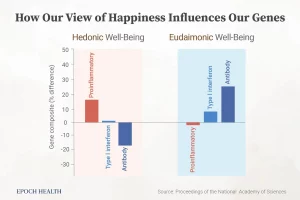Surprising Ways to Heal Our DNA
After COVID Injuries
Sitting quietly may seem uneventful, but it can affect many important things happening inside our body, including DNA healing. This is real science.
Repairing our DNA may seem impossible, but it’s not.
Our body has natural self-healing mechanisms to protect against harmful stimuli, and there are natural ways to enhance this process.
Some people find meditation or mindfulness training boring or irrelevant to their lives, but countless studies have shown that it can lead to positive changes in gene expression.
Meditation is a practice that involves sitting in stillness without thinking or engaging in simple movements. It originated from traditional Asian culture and has since evolved into various exercises, including mindfulness meditation. The primary objectives of this practice include regulating the mind, eliminating distractions, promoting positive and calm thoughts, and finding inner peace and serenity.
By meditating regularly, we can actually help our body repair its DNA.
Specifically, this study found that pivotal pathways responsible for DNA repair and stability are consistently improved after meditation.
DNA damage is often caused by inflammation, oxidative stress, viral infections, and other toxic insults, and meditation helps reduce these damaging stimuli.
The research data indicates that meditation activates 220 genes directly linked with immune response, including 68 genes related to antiviral potency, particularly interferon signaling. The top 10 genes affected are known for their essential role in the type I interferon pathway, which is the most relevant to frontline antiviral immunity.
The impact on the genes took place quickly. Nearly 44 percent of the genes were altered immediately after meditation, followed by 30 percent at the three-month follow-up.
It’s particularly important to note that the study found that meditation improved immune function without triggering inflammatory markers.
Scientists analyzed their gene expression profile pre- and post-music sessions and found that listening to music was linked to a 2.3 times increase in the activity of genes across the entire genome, particularly neurodegeneration-related genes in people with age-related cognitive disorders, compared with the non-diseased group.
This increased gene activity was especially seen in genes related to the breakdown of diseased brain cells in Alzheimer’s disease, which is a cellular self-healing process. The study was published in 2023 in Scientific Reports, a journal within the Nature Portfolio.
A group of Finnish scientists and artists conducted a study where they analyzed the gene expression profiles of 48 people who listened to classical music and 15 people who listened to nothing.
Classical music not only has the potential to heal our brain cells at a genetic level, but may also help us live longer.
The type of music we listen to appears to matter. Pop music may not be as beneficial to people as other genres.
The human lifespan is closely linked with the self-repairing abilities of our genes. The more powerful our DNA self-repairing abilities are, the more stable our genes will be and the longer we may live.
DNA Responds to Our Thoughts
Our thoughts may seem intangible, but scientists have found extensive evidence that they have a real-time impact on our DNA, prompting us to reconsider how we perceive our lives.
People who experience hedonic happiness typically feel happy when they engage in activities that provide them with immediate pleasure, such as indulging in a delicious meal or consuming alcohol. In contrast, those who experience eudemonic happiness tend to derive pleasure from achieving a greater purpose in life, such as contributing to society or helping others.
The study found that people who are inclined towards justice and noble goals have a distinct genetic profile indicating a greater potential for fighting viruses, including higher interferon gene expression, increased ability to produce antibodies, and a lower expression of inflammation-related genes.

Healing delicate DNA doesn’t require advanced technology, as research shows, even small, seemingly insignificant habits can have powerful effects.
